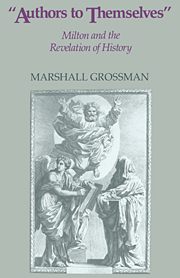8 - The Revelation of History
Published online by Cambridge University Press: 23 October 2009
Summary
THE LENS THROUGH WHICH I HAVE VIEWED PARADISE LOST is shaped by three assumptions about the function and process of narrative. The first is that the subjects of a narrative are defined by what may be predicated of them. If I ask someone to define his subjectivity – that is, to explain who he is – he will inevitably tell me a story. This story will necessarily be structured by a series of predications: I was born in the city of …, I attended school at …, and so on. My sense of this person (and his of himself) will be determined by the attributes and actions of which he can be conceived to be the subject. If he attempts to be exhaustive, his story will eventually include an account of my question and an attempt to narrate his narration of its answer. Walter Benjamin appreciates this parabolic conundrum in an essay entitled “The Storyteller,” where he remarks that
not only a man's knowledge or wisdom, but above all his real life – and this is the stuff that stories are made of – first assumes transmissible form at the moment of his death. Just as a sequence of images is set in motion inside a man as his life comes to an end – unfolding the views of himself under which he has encountered himself without being aware of it – suddenly in his expression and look the unforgettable emerges and imparts to everything that concerned him that authority which even the poorest wretch in dying possesses for the living around him.
- Type
- Chapter
- Information
- Authors to ThemselvesMilton and the Revelation of History, pp. 177 - 196Publisher: Cambridge University PressPrint publication year: 1988



